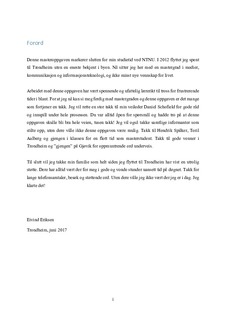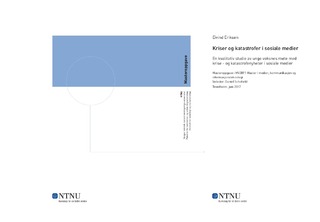| dc.description.abstract | In line with our ever-increasing usage of social media, consumption of news is undergoing significant changes. This thesis explores the experience of consuming news through social media as opposed to more traditional news platforms. To delineate, I chose to focus on crisis and disaster news, due to the recent increase of such reports. The purpose of this thesis is to investigate how young adults experience reading news of this kind on social media.
The empirical data has been collected by means of in-depth interviews with eight eighteen- to twenty-year-old informants. In order to adequately respond to the research question, theories of media usage, news and news consumption, social media, ethics, affiliation and role theory are used. The research study shows that news consumption was important to all informants, driven by a commitment to certain topics, or a desire to participate in daily discussions with others.
The study reveals a tendency towards using social media as a bridge to news, where informants were not directly searching for news, but were exposed to a story because they used Facebook on a daily basis. Although the coverage was perceived to be better on TV and in online newspapers, they nevertheless chose Facebook as their main source of news, mostly due to its increased flexibility, ease of use and constant presence in their lives. Informants reported different views of crisis and disaster news: some deemed it important to cover such issues, while others thought such coverage did nothing to help in these situations. Therefore, in a bid to reduce the appearance of such news on social media, the latter group either practised an avoidance technique, or performed a direct act of reporting content as inappropriate. Despite stating a preference for reading news via social media, TV was their main source of news regarding the July 22nd and Paris terror attacks. All informants chose to view this coverage together with their parents, in contrast to their regular news consumption.
An additional factor of importance in how informants responded to crisis and disaster news was an event’s location. For most, the degree of fear they experienced increased relative to the geographical proximity of the event; the remaining informants were of the opinion that all crises and disasters, regardless of location, are equally terrible, but that the media generally add to the extent to which they are affected. | nb_NO |

